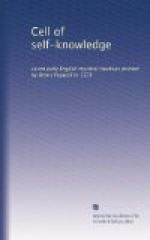And this is the cause why Rachel had first children of her maiden than of herself. And so it is that, though all a man’s soul may not yet get the light of ghostly knowing in the reason, yet it thinketh it sweet to hold the mind on God and ghostly things in the imagination. As by Rachel we understand reason, so by her maiden Bilhah we understand imagination. And, therefore, reason sheweth that it is more profitable for to think on ghostly things, in what manner so it be; yea, if it be in kindling of our desire with some fair imagination; than it is for to think on vanities and deceivable things of this world. And, therefore, of Bilhah were born these two: Dan and Naphtali. Dan is to say sight of pains to come; and Naphtali, sight of joys to come. These two children are full needful and full speedful unto a working soul; the one for to put down evil suggestions of sins; and the other for to raise up our wills in working of good and in kindling of our desires. For as it falleth to Dan to put down evil suggestions of sin by sight of pains to come, so it falleth to the other brother Naphtali to raise up our wills in working of good, and in kindling of holy desires by sight of joys to come. And therefore holy men, when they are stirred to any unlawful thing, by inrising of any foul thought, as oft they set before their mind the pains that are to come; and so they slaken their temptation in the beginning, ere it rise to any foul delight in their soul. And as oft as their devotion and their liking in God and ghostly things cease and wax cold (as oft times it befalleth in this life, for corruption of the flesh and many other skills),[54] so oft they set before their mind the joy that is to come. And so they kindle their will with holy desires, and destroy their temptation in the beginning, ere it come to any weariness or heaviness of sloth. And for that[55] with Dan we damn unlawful thoughts, therefore he is well cleped in the story “Doom."[56] And also his father Jacob said of him thus: “Dan shall deem his folk."[57] And also it is said in the story that, when Bilhah brought forth Dan, Rachel said thus: “Our Lord hath deemed me";[58] that is to say: “Our Lord hath evened me unto my sister Leah.” And thus saith reason, when the imagination hath gotten the sight of pains to come, that our Lord hath evened her with her sister affection; and she saith thus, for she hath the sight of pains to come in her imagination, of the which she had dread and sorrow in her feeling. And then after came Naphtali, that is to say, the sight of joys to come. And in his birth spake Rachel and said: “I am made like to my sister Leah";[59] and therefore is Naphtali cleped in the story “Likeness."[60] And thus saith reason that she is made like to her sister affection. For there as she had gotten hope and love of joy to come in her feeling, she hath now gotten sight of joy to come in her imagination. Jacob said of Naphtali that he was “a hart sent out, giving speeches of fairhead."[61] So it is that, when we imagine of the joys of heaven, we say that it is fair in heaven. For[62] wonderfully kindleth Naphtali our souls with holy desires, as oft as we imagine of the worthiness and the fairhead of the joys of heaven.




